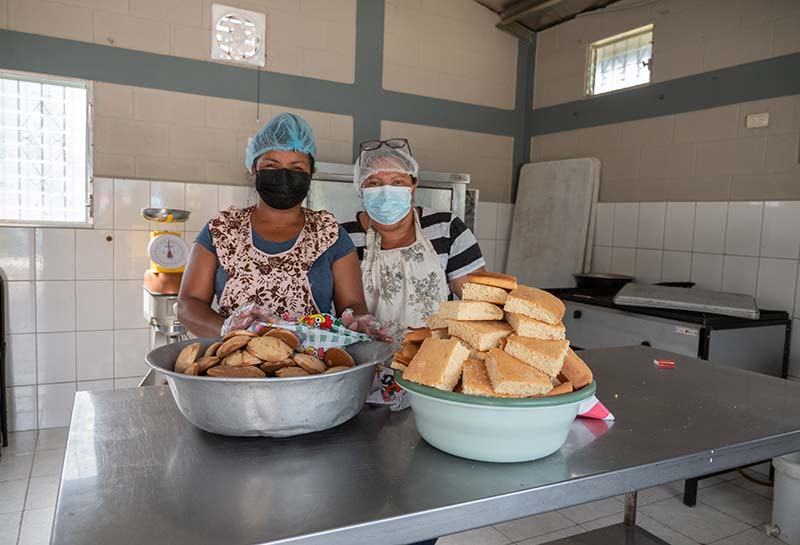The concept of sustainable development is not new. It emerged in the 1980s as a solution to the challenge of meeting the material needs of today’s global population while maintaining the quality of the environment for following generations.
Beyond protecting the environment, sustainable development focuses on empowering impoverished people and communities and helping them to forge a path out of poverty.
The main goal of sustainable development, according to Alicia Narvaez, Food For The Poor’s Monitoring, Evaluation, Design, Accountability and Learning (MEDAL) Manager, is to “improve the quality of life for families through economic empowerment, through community empowerment and organization and to provide the tools so families can achieve these goals.”
Since poverty is not a one-dimensional challenge, she said, “we need to address it from a multidisciplinary approach and address the economic, social and even the spiritual challenges of the communities where we serve.”
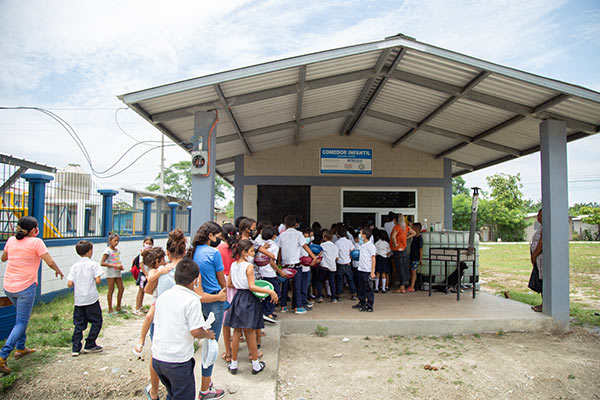
Linda Coello, President and Founder of CEPUDO in Honduras and a longtime Food For The Poor partner, has dedicated her life to helping lift women and families out of poverty. She understands the importance of looking at the big picture.
“Addressing poverty on all fronts is important because poverty is a cycle,” Coello said. “If one aspect of it is left unattended, there isn’t a way to overcome it. Because of this, sustainability is necessary to help people in need. It’s not a one-time donation but rather a lifetime commitment to development.”
In this post, we will look at four examples of how employing sustainable development principles helps Food For The Poor bring about transformative change.
4 Ways Sustainable Development Makes It Easier to Escape Poverty
Families living in poverty experience multiple deprivations every day that include food insecurity, poor health, lack of education, inadequate living conditions and scarcity of steady work, to name a few.
When sustainable development practices are employed, it becomes easier for impoverished families and individuals to escape the bonds of poverty and gain the freedom and opportunity they need to create their own future.
1 – Access to Drinking Water and Sanitation. One of the most pressing issues facing communities in poverty is lack of access to drinking water and adequate sanitation facilities.
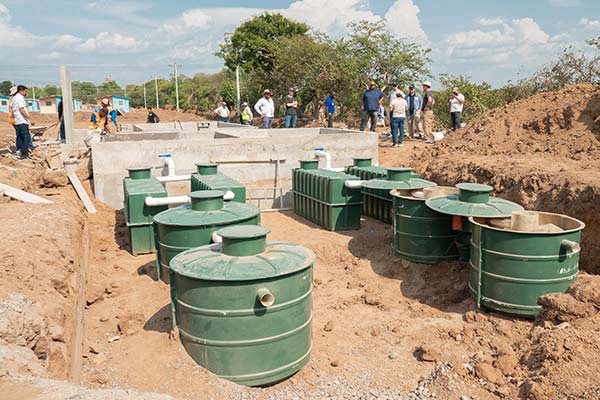
Today, one in four people do not have access to safe water sources, according to World Health Organization-UNICEF joint monitoring data, putting children and families at great risk of infectious diseases, including cholera, diarrhea, dysentery, hepatitis A, typhoid and polio.
Food For The Poor has been working with Water Mission to install water treatment systems capable of purifying and chlorinating thousands of gallons of water daily.
In 2020, Water Mission partnered with Food For The Poor and CEPUDO to provide a water treatment system to the communities of Bosque de Santa Lucia, Campo Las Flores and Los Achiotes in Honduras after back-to-back hurricanes destroyed 12 bridges.
“Using the Living Water Treatment System (LWTS) as one of our tools in Global Water, Sanitation and Hygiene (WASH), we can provide treated drinking water for families and communities,” said Dr. Kirsten Roe, WASH Technical Advisor and University Partnerships Liaison at Food For The Poor. “Treated water, as a safer water source, helps reduce waterborne illnesses and deaths, especially in children under the age of 5. It also helps reduce the number of days children must spend getting water or being sick instead of going to school.”
Other benefits, Roe noted, include improving the absorption of nutrients from foods, facilitating hygienic practices like handwashing, reducing the time adults are unable to work and reducing dehydration, all of which improve health and quality of life.
As a Project Manager at Food For The Poor for the past 16 years, Alberto Gonzalez has witnessed firsthand how impactful water access can be for a family in an underdeveloped country.
“Visiting people who have no access to anything other than contaminated water is something that strikes fear into the heart,” he said. “Water is literally the essence of life, and without it, that life ceases to exist.”
2 – Access to Safe, Affordable Housing. Food For The Poor believes that providing safe and secure housing delivers an important foundation for families to begin the path toward self-sufficiency.
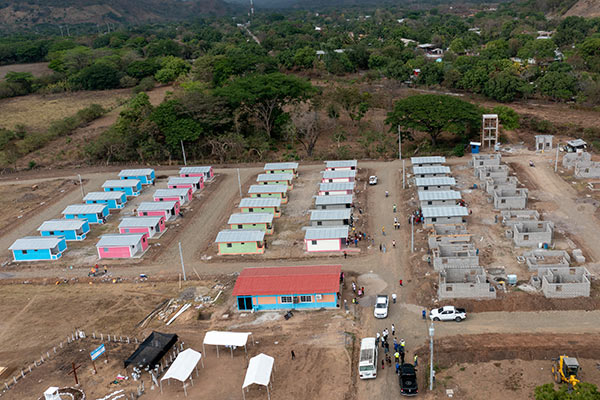
This is evident with the sustainable development of Palma Real in Granada, Colombia, the first large-scale sustainable community development created over five years as a joint effort of Food For The Poor and Colombian partner Minuto de Dios.
“Food For The Poor has been committed to playing a major role in the United Nations’ 17 Sustainable Development Goals, developing projects such as the Palma Real project in Colombia as a solution to make cities and human settlements inclusive, safe, resilient, and sustainable (Goal 11),” explained David Langle, Project Manager for South America at Food For The Poor.
According to Langle, since 60 families of the Palma Real project have received homes, quality of life improvements are evident, “thanks to the creation of living spaces and development environments that provide autonomy and freedom allowing families the ability to take care of their children, thus improving family unity and cohesion.”
New homes make an amazing difference for families, said Coello, who has witnessed this in Honduras.
“A new house makes a family secure emotionally, financially and socially, especially for children who feel safe and have a dignified place to call home,” Coello said. “They get to have roots and a permanent address. With this, they are able to get job opportunities or start a little business from home.”
No matter the country, basic housing is the beginning of the process of assisting a family in moving toward a sustainable livelihood and community empowerment, and has a tremendous, positive impact.
In Honduras, the village of Los Achiotes is another example of how a safe, sturdy home can turn lives around, giving people the chance to thrive, not just survive.
“When we first began working with this community,” Coello explained, “their homes and land had been decimated by different hurricanes. They have kept their strength and sense of community through good and bad due to the leadership of a good person in the community. Now that they have better opportunities, it makes it easier for them to succeed.
3 – Income Generation and Employment Opportunities. By supporting small businesses, entrepreneurs and farmers, sustainable development practices can increase economic stability in communities, thereby providing a break in the cycle of poverty.
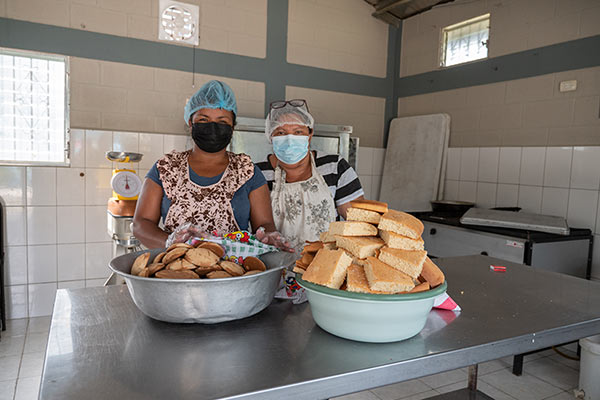
An innovative partnership between Food For The Poor and Acceso is empowering farmers and food service workers and helping feed hungry children and families.
By partnering with Acceso, an organization focused on creating positive economic change in the lives of rural smallholder farming families in Colombia, Haiti and El Salvador, Food For The Poor is providing opportunities for stable access to formal markets and a sustainable source of income.
During the seed-to-market process, Acceso trains the farmers and gives them supplies such as seedlings, and they provide farmers with low-interest loans that the farmers repay with produce.
Their crops are purchased at fair market prices and the food is directed to existing feeding programs for locals and schoolchildren. The partnership has delivered locally sourced meals and snacks to 5,000 children in Colombia and Haiti, with plans to expand the joint venture in El Salvador.
In Colombia, local production will be used to expand feeding programs and improve nutrition, deliver tons of produce, feed an additional 1,000 schoolchildren, raise farmer and food system worker income, and start new community training farms to give 170 vulnerable women and young people intensive training. Initiatives would support 500 additional farmers in nearby communities.
Langle reported that Food For The Poor is currently promoting sustainable land-use planning and management through the construction of a Development Center as a key component of the Palma Real project, “which will provide economic opportunities that best serve the local market and generate income for families, ultimately improving their quality of life.”
4 – Education and Skills Development. Skills training improves lives by providing people with the tools they need to help them earn a livelihood and contribute to their communities.
Food For The Poor recognizes the important connection between education and reducing poverty and fostering economic growth.
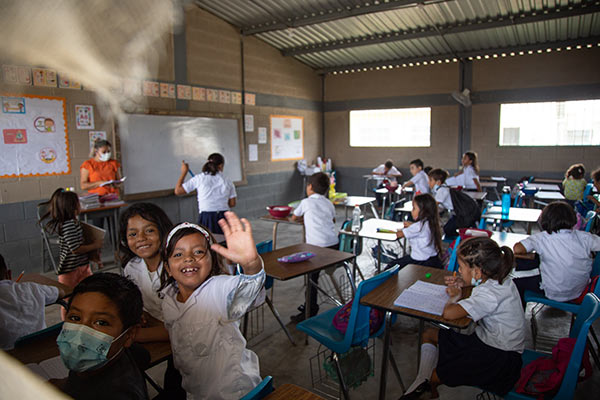
“People who have higher levels of education are more likely to enjoy advantages such as increased income and skills to become agents of change for social transformation in their communities,” according to Rochelle Stanton, Food For The Poor Income Generating Activities Analyst.
With an eye on the future, Food For The Poor is working with in-country partners Entreculturas and Fé y Alegría on a project designed to create educational and income-generating opportunities for at-risk youths in Guatemala, El Salvador and Honduras by providing them with skills training to enhance their employability and improve their career prospects.
According to Stanton, focusing on the youth is significant because they are indeed the agents of change who will shape the future.
“The youth have the potential to yield long-term benefits,” Stanton said. “By providing them with the necessary support and opportunities, we can shape their development and ensure an improved future.”
This project, which is targeted to people ages 14 to 29, will include the provision of materials, supplies and equipment that will impact 2,917 young people and 11,668 community members in these three countries.
The Power of Sustainable Development
The importance of sustainable development in addressing the environmental, economic and social issues we face today cannot be underestimated or ignored if we are to grow and flourish as a community, a society and a civilization.
“We are investing in the lives of the current generations,” noted Narvaez, “but also of the new generations that will be the leaders of the communities.”
By focusing on the holistic, inclusive approach of sustainable development, transformative change can have a huge positive impact on families, communities and regions.
Our future depends on it.
Be Part of Something Big: Help Us Change the World
Changing the world will not be accomplished overnight. Nor will it be achieved by one person. It will take a global village.
Become part of something big and help us change the world. Visit www.FoodForThePoor.org, click on Help Now and search for the program or project that speaks to your heart. Many little acts of kindness can make a big difference.

